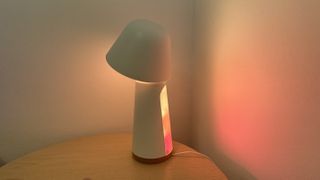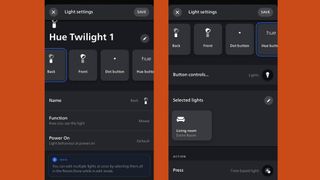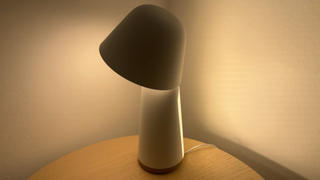Two-minute
review

(Image
credit:
Future)
I’ve
been
waiting
a
long
time
for
a
smart
light
brand
to
release
a
truly
smart
wake-up
light,
and
it’s
no
surprise
that
Philips
Hue
is
first
with
its
beautiful
new
Twilight
smart
light.
While
most
smart
lights
offer
some
form
of
wake-up
or
circadian
functionality,
and
many
smart
home
hubs
also
allow
you
to
turn
your
regular
smart
lights
into
bona
fide
wake-up
lights,
the
Philips
Hue
Twilight
is
first
to
thoughtfully
incorporate
wake-up
functionality
into
the
design
and
software
from
end-to-end,
cementing
it
as
one
of
the
best
smart
lights
I’ve
ever
tested.
Standing
at
12.9-inches
/
33cm
tall,
the
Twilight
lamp
is
an
exercise
in
design
mastery
from
Philips
Hue.
Available
in
either
a
black
or
white
casing,
the
unit’s
rounded
stem
is
footed
by
a
cork
base,
and
tapers
towards
the
head
of
the
lamp,
which
is
shaped
like
an
upturned
cup.
It’s
a
slick
and
chic
device
that
looks
wonderful
in
either
color
–
and
while
it
might
not
be
for
everyone,
it’s
a
major
step
up
in
aesthetics
from
Hue
compared
to
some
of
its
previous
designs,
such
as
the
Philips
Hue
Go
Table
lamp
and
Hue
Bloom.
On
the
top
of
the
head
are
two
programmable
buttons
that
by
default
trigger
automations
and
cycle
through
six
different
scenes,
offering
both
“press”
and
“press
and
hold”
controls.
Through
the
Philips
Hue
app,
you
can
change
how
the
buttons
and
the
lights
behave,
presenting
a
fantastic
level
of
customizability.
Behind
the
frosted-encased
rear
panel
sit
the
LED
lights.
It
isn’t
the
most
attractive
look,
but
since
the
rear
of
the
light
will
in
all
likelihood
be
wall-facing,
it
isn’t
a
dealbreaker.
The
LEDs
point
slightly
upwards,
which
enables
them
to
spray
a
wonderful
cone
of
light
up
walls
– plus
they
also
feature
separate
strips
that
can
create
gradient
lights
using
Hue’s
new
Gradient
ColorCast
technology.
The
head
also
contains
another
set
of
independently
controllable
direct
LED
lights,
and
can
be
rotated
90
degrees
to
the
left
and
right
–
a
nice
touch
for
those
who
enjoy
reading
in
bed.

(Image
credit:
Future)
The
part
of
the
design
I
wasn’t
so
impressed
by
is
the
2.4
x
1.9
x
3.1-inches
/
6
x
4.8
x
8cm
(h
x
w
x
d)
power
supply.
If
your
plug
socket
is
directly
behind
your
bedside
table,
you’ll
likely
need
your
table
to
be
sitting
further
away
from
the
wall
to
account
for
the
Twilight’s
very
proud
plug.
However,
when
it
comes
to
the
light
itself,
I’d
go
as
far
as
to
say
this
is
the
best
I’ve
seen
from
Hue
–
and
given
the
bar
is
pretty
high,
I’m
very
much
impressed.
Hue
claims
it
can
be
dimmed
to
0.5%
brightness,
and
while
I
couldn’t
easily
measure
that,
what
I
can
say
is
that
dimming
proved
incredibly
smooth,
with
a
near-imperceptible
transition
between
the
light’s
lowest
brightness
and
fading
out
completely.
According
to
Hue,
there’s
more
than
just
some
buttons
and
software
that
make
Twilight
well-suited
for
use
as
a
wake-up
light.
The
night-time
scenes
that
come
included
as
defaults
for
both
manual
and
in-app
control
omit
blue
light,
which
suppresses
melatonin,
while
its
wake-up
scenes
are
attuned
to
emulate
sunrise.
In
addition
to
its
natural
light
settings,
the
Philips
Hue
Twilight
smart
light
is
also
able
to
reproduce
the
full
range
of
colors
you’d
expect
from
a
Hue
device,
meaning
you
can
also
set
the
mood
with
some
beautifully
vibrant
scenes.
In
addition,
the
rear
light
is
fully
programmable,
so
you
can
also
create
custom
gradients
to
match
other
gradient
lights
such
as
the
Hue
Signe.
The
Twilight
integrates
easily
into
the
Hue
app,
with
both
Bluetooth
and
Hue
Bridge
connectivity
on
offer
–
but
here
lies
one
of
the
biggest
issues
I
have
with
the
product:
its
limited
functionality
when
paired
via
Bluetooth.
For
some
reason,
the
two
light
sources
can’t
be
controlled
in
conjunction
with
one
another
in
this
configuration,
and
many
of
the
automations
aren’t
available.
Price
and
availability
-
List
price:
$279
/
£249
The
Philips
Hue
Twilight
smart
light
will
set
you
back
$279
/
£249,
and
is
available
in
both
black
and
white
colorways.
Compared
even
to
Philips
Hue’s
own
alternatives,
such
as
the
Hue
Go
portable
table
lamp
(list
price:
$159.99
/
£139.99),
that’s
one
frighteningly
expensive
lamp.
It’s
a
running
issue
with
Philips
Hue.
While
its
smart
lighting
is
arguably
some
of
the
best
–
if
not
the
best
–
on
the
market,
such
a
lofty
price
tag
is
tough
to
swallow.
In
Twilight’s
defense,
both
its
design
and
performance
are
top-tier
–
with
the
exception
of
my
gripes
with
its
plastic
casing,
limited
Bluetooth
functionality
and
large
power
supply.
I
have
the
same
opinion
about
the
Hue
Go
portable
table
lamp.
Given
that
there
are
a
wealth
of
more
affordable
smart
lights
on
the
market,
some
competitive
pricing
from
Philips
Hue
feels
in
order.
Specs
table
to
scroll
horizontally
| Price: |
$279 / £249 |
| Dimensions: |
12.9 x 6.5 x 6.3-inches / 33 x 16.4 x 16cm (H x W x D) |
| Weight: |
2.4lb / 1.1kg |
|
Cable length: |
6.5ft / 2m |
|
Lumen output at 4000K: |
1,380 lm |
|
Lifetime up to: |
25,000 hours |
|
Light color: |
2000-6500 Hue White Color Ambiance |
|
Mains power: |
100–240 V |
Score
card
to
scroll
horizontally
| Attribute | Comments | Score |
|---|---|---|
| Value |
While the Philips Hue Twilight is one of the best smart lights I’ve tested and stands out as a unique offering, the price feels steep, especially given its plastic casing. | 4/5 |
| Design |
The design might not be for everyone, but I’m a fan. Plus, it’s packed with genuinely useful, creative features and clever engineering – although I wish it was made of something other than plastic. | 4/5 |
| Performance |
Offering the best of Hue’s lighting software and technology, beautifully bright and vibrant LEDs and a great host of tailor-made scenes, Twilight feels like something of a magnum opus from Hue. | 5/5 |
How
I
tested
-
I
used
the
Philips
Hue
Twilight
lamp
as
my
main
wake-up
light
and
bedroom
lamp
for
two
weeks -
I
tried
all
of
its
various
presets
and
features -
I
used
it
both
with
and
without
a
Hue
Bridge

(Image
credit:
Future)
I
used
the
Philips
Hue
Twilight
for
two
weeks
as
my
main
bedroom
light,
testing
all
of
its
wake-up
and
wind-down
presets,
morning
and
night,
to
see
how
effectively
they
helped
to
regulate
my
sleep
schedule.
I
paired
it
both
via
Bluetooth
and
also
through
my
Philips
Hue
Bridge
to
compare
its
feature
set
and
functionality
in
various
connectivity
modes.
I
controlled
it
through
my
smart
home
speakers
to
see
how
responsive
it
was,
and
tested
the
various
color
options
to
see
how
vibrant
of
a
payoff
the
lights
delivered.
I’ve
been
testing
smart
home
technology
for
over
two
years,
filling
my
home
with
abundant
smart
lighting
and
devices
from
the
likes
of
not
only
Philips
Hue,
but
some
of
the
biggest
competition
across
smart
lighting.

